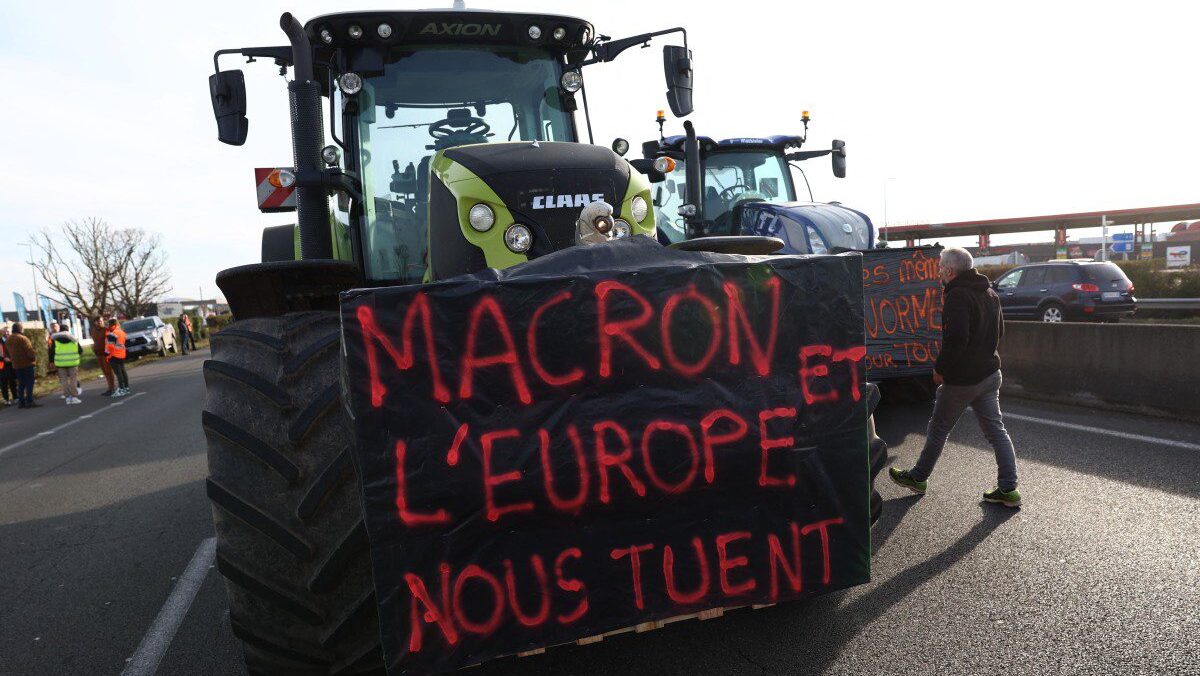
A banner hangs from a tractor reading “Macron and Europe are killing us” during a road blockage of the A6 highway near Villabe, south of Paris, on January 29, 2024, amid nationwide protests called by several farmers unions on pay, tax, and regulations. Local branches of major farmer unions FNSEA and Jeunes Agriculteurs announced on January 27, 2024, a “siege of the capital for an indefinite period” starting at 2 p.m. on January 29, 2024.
Photo: Emmanuel Dunand / AFP
A breakdown in talks between the French government and farmers’ groups has raised the prospect of prolonged rural resistance on an extraordinary scale as tractors rolled into the capital region on Monday in a campaign uniting farmers from across the country. Farmers have said their goal is to block food deliveries from reaching supermarkets inside the capital city.
On Sunday, the president of the FNSEA farmers union, Arnaud Rousseau, declared his intention to escalate demonstrations in an attempt to force the government to quickly respond to their demands. French Prime Minister Gabriel Attal over the weekend acquiesced to some aspects of the demands—holding off on phasing out a planned tax break on diesel fuel for agricultural equipment and implementing financial support for farmers whose animals fall ill— measures deemed insufficient by the farmers.
By Monday morning, French authorities had started putting up barriers around airports and other strategic spots around the capital. 15,000 police and paramilitary gendarmes were deployed in response to the anticipated protests, with one senior farmer representative describing the situation as a “pressure cooker ready to explode.” An attempt to block motorways and other transport junctions to prevent demonstrators from entering the city followed.
Agrarian discontent brewing in France has exploded over the past two weeks, mirroring actions seen in Germany and the Netherlands. Farmers, a traditionally conservative constituency, are leaving their lands to rally against harsh new green measures that threaten their livelihoods as well as their way of life.
#BlocusDeParis:
— Infos politique (@Mrpolitique88) January 29, 2024
L'A13 au niveau de Rocquencourt (sens Paris): La circulation est à l'arrêt complet. Les taxis parisiens et franciliens rejoignent les agriculteurs. C'est ça qu'on veut ! Partagez #Rungis#blocageDeParis #AgriculteursEnColere pic.twitter.com/ykO1o5WPpk
Monday afternoon saw reports of gridlock around the outskirts of Paris, backed by footage on social media showing protesting taxi drivers joining farmers in helping to shut down the city in support of their protest.
🛑 Les taxis, comme les agriculteurs, sont en colère.
— Céline d’Arc (@pam33771) January 29, 2024
Des taxis manifestent dans toute la France avec des blocages et des opérations escargots. L'autoroute A13 en direction de Paris est bloquée au niveau de Rocquencourt. pic.twitter.com/voAkeOUQXy
Le convoi d’Agen de la @coordinationrur du 47 est en train d’arriver au rond-point de rassemblement à Bergerac en #Dordogne. Une cinquantaine de tracteurs, beaucoup de jeunes, applaudis et acclamés par les locaux qui les attendent sur le rond-point #AgriculteursEnColere pic.twitter.com/Vg4xrhUFIh
— France Bleu Périgord (@Bleu_Perigord) January 29, 2024
French farmers have been mobilised by falling income and new EU eco-measures on rewilding and limits on the use of nitrate fertilisers, which decimates both the crops and the income of working farms.
[ 🇫🇷 FRANCE ]
— (Little) Think Tank (@L_ThinkTank) January 29, 2024
🚜Désormais en Dordogne, le convoi des agriculteurs parti d’Agen (Lot-et-Garonne), ce matin, « s’étire sur plusieurs kilomètres », selon une journaliste sur place. L’arrivée sur Paris est prévue dans la nuit de mardi à mercredi. pic.twitter.com/RDcJUfnFqg
The protests are working and well-supported, prompting President Macron to give orders to prevent tractors from disrupting Paris’s business district. Officials fear that protesters may encircle the southern commune of Rungis, which contains an enormous wholesale market that supplies some 10 million consumers. Spelling out the message that ‘farming equals food,’ this action would remind urban France of the pivotal role played by food production in modern life and quite possibly gain support for demonstrating farmers from urban dwellers. Ahead of this year’s EU elections, the Continent’s agricultural sector is in reasonable uproar as farmers rebel against government policies attempting to fulfil the much-hyped green deal. An influx of cheap Ukrainian foodstuffs is also inflaming the situation.
This week the European Commission will decide on whether to extend the agreement with the Ukrainian government to suspend tariffs on agricultural goods. Commission President Ursula von der Leyen faces a backlash from both her own EPP party and the EU’s agriculture commissioner Janusz Wojciechowski, who are warning about the threats to the entire sector if the politically motivated tariff suspension continues.
